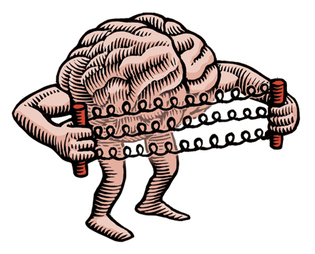 loading
loading
FindingsBorn-again brainsA molecular switch that can be turned on again to help trauma sufferers.  Gregory NemecView full imageBeleaguered parents sometimes think of the phrase “teenage brain” as an oxymoron, but neurobiologists see it as a miracle. Adolescent neurons can rearrange themselves with relative ease, and the youthful central nervous system is capable of repairing itself in ways an adult nervous system can’t. Researchers at Yale say they now understand why: they have discovered a molecular switch that turns off neurological plasticity when people reach adulthood. They have also figured out a way to turn it on again—in mice, at least. “We now have a way to set the clock back substantially,” says Stephen Strittmatter, the Vincent Coates Professor of Neurology at the School of Medicine. “So we might be able to come up with better treatments for human strokes and spinal cord injuries as well as post-traumatic stress disorders.” The key is a protein called NoGo Receptor 1 (NgR1). From conception through most of adolescence, the protein is inactive, and as a result, neurons are free to try new configurations. This is probably why it’s so easy to learn new things, such as language and music, when we’re young. But as adulthood approaches, the NgR1 system is gradually activated, and the brain becomes essentially hard wired. “NgR1 is part of the cementing mechanism that keeps our brain and CNS stable,” says Strittmatter. The researchers used mice engineered to lack the NgR1 gene, as well as mice treated in adulthood with chemicals that block its action. They reported in Neuron that the adult brains of both these groups of animals were able to rearrange synaptic connections much more quickly than normal adult mice. Axerion Therapeutics, a company Strittmatter and others started several years ago, is developing medications that might make our central nervous system more malleable, with human trials projected to begin in a couple of years. But don’t worry, says Strittmatter: “We’re not trying to turn adults back into teenagers.”
The comment period has expired.
|
|